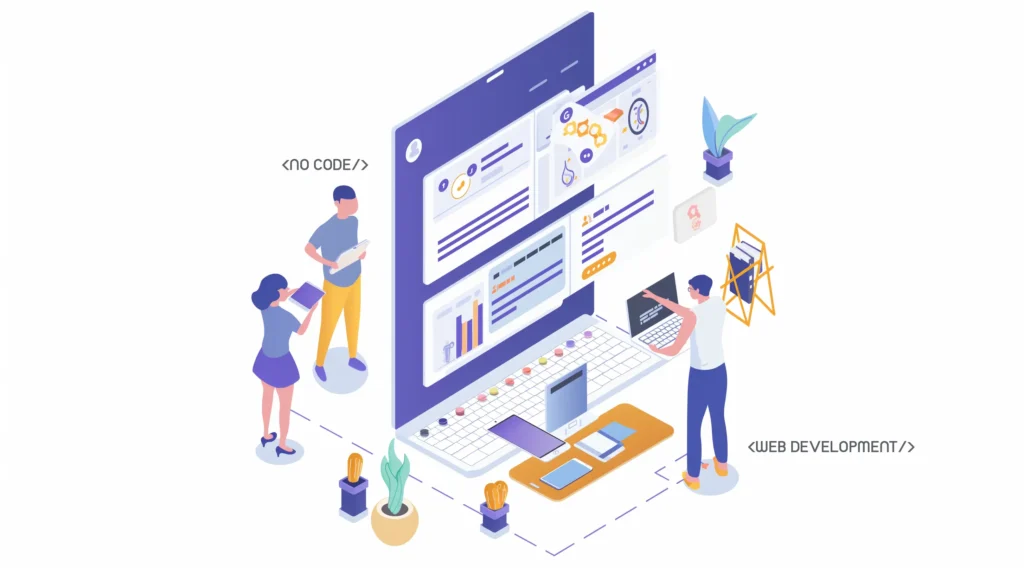
Is learning a “no code website builder” worth it in today’s digital landscape? With the ever-growing demand for online presence, businesses and individuals face the challenge of creating websites efficiently and effectively. The emergence of no-code website builders has provided a compelling solution, promising to streamline the website development process without coding expertise. But is investing time and effort in mastering these platforms truly worthwhile? Let’s delve deeper into this question and explore the benefits and considerations of learning a no-code website builder.
What is no code website builder?
In the realm of website development, the concept of “no code website builder” has emerged as a game-changer, revolutionizing the way websites are created and managed. But what exactly does “no code” entail? A no-code website builder is a user-friendly platform that empowers individuals to design, customize, and launch fully functional websites without traditional coding skills. These intuitive tools provide a simplified interface where users can visually construct their websites using drag-and-drop elements, pre-designed templates, and customizable features.
The appeal of no-code website builders lies in their accessibility and ease of use. Unlike traditional coding methods that require proficiency in programming languages such as HTML, CSS, and JavaScript, no-code platforms democratize website development by removing technical barriers.
Why You Should Learn No-Code?
As we know what no-code website builder is. Now, you come up with a question why should we learn? right. Let’s discuss this.
In the modern age of technology, knowing how to use a no-code website builder is crucial for several reasons. Firstly, its accessibility and ease of use make it a viable option for individuals without coding expertise. Secondly, it offers a cost-effective solution, saving both time and money compared to traditional coding methods. Additionally, mastering a no-code builder provides autonomy over website management and enables quick updates and modifications. Moreover, it fosters creativity, allowing users to design websites that reflect their unique vision. Overall, learning a no-code website builder is a valuable investment for anyone looking to establish a strong online presence efficiently and effectively.
Where No-Code Tools Are Being Used?
No-code technologies have become widely used in various sectors and industries, enabling users to construct professional websites and applications easily. No-code platforms are transforming the way people approach web development, from startups and small businesses to well-established corporations.
One prominent area where no-code tools are being utilized is in the realm of entrepreneurship. Aspiring entrepreneurs are leveraging these platforms to launch their ventures online quickly and affordably. Whether it’s creating a landing page for a new product or setting up an e-commerce store, no-code website builders provide the necessary tools to get businesses up and running in no time.
Additionally, no-code tools are making waves in the nonprofit sector, where organizations with limited resources can create compelling websites to raise awareness for their causes. These platforms empower nonprofits to share their stories, mobilize supporters, and drive social impact without the need for extensive technical expertise.
Moreover, educational institutions are embracing no-code tools to enhance learning experiences and foster creativity among students. Teachers and students alike can use these platforms to build interactive websites, educational apps, and digital portfolios, enriching the learning process and promoting digital literacy.
Furthermore, no-code tools are gaining traction in the freelance and gig economy. Freelancers and independent professionals are utilizing these platforms to showcase their skills, attract clients, and streamline their workflows. Whether it’s building a personal brand website or creating client projects, no-code website builders offer freelancers the flexibility and autonomy they need to succeed in today’s competitive market.
In summary, no-code tools are being used across a diverse range of industries and sectors, empowering individuals and organizations to create professional websites and applications without the need for coding expertise. From entrepreneurship to nonprofits, education, and freelancing, these platforms democratize web development and unlock new opportunities for innovation and growth.
How to get started
Starting your journey with no-code website builders is simple and open to all. Begin by choosing a reputable platform that meets your needs and preferences. Take advantage of the platform’s tutorials and guides to get to know its interface and features. Choose a template that fits your vision or start with a blank canvas to express your creativity. Easily customize your website by adding text, images, and other elements with the platform’s intuitive drag-and-drop editor. When you’re finished with your design, preview it to make sure everything looks good, and then publish your website with a single click. Remember to keep exploring and experimenting with new features to help your website improve and refine over time. With these simple steps, you’ll be well-prepared to begin your journey to mastering no-code website building and effortlessly creating stunning websites.
Why No-code Website Builders Becoming Popular Day by Day
No-code website builders’ popularity is growing, and the data supports this. According to recent industry reports, the adoption of no-code and low-code development platforms has grown at an exponential rate, with a projected market value of more than $187 billion by 2025. Several factors contribute to this rapid growth.
Firstly, the accessibility and ease of use offered by no-code tools have democratized website development, allowing individuals without coding skills to create professional-grade websites effortlessly. This accessibility has fueled a significant increase in the number of businesses and individuals leveraging these platforms to establish their online presence.
Moreover, the cost-effectiveness of no-code website builders makes them an appealing option for startups and small businesses operating on limited budgets. By eliminating the need for hiring expensive developers or investing in extensive coding training, these platforms enable cost-conscious entrepreneurs to launch their ventures online quickly and affordably.
Additionally, the flexibility and versatility of no-code tools have contributed to their rising popularity. Users can choose from a wide range of templates, design elements, and integrations to create customized websites that align with their unique brand identity. This flexibility empowers businesses to stand out in a crowded digital marketplace and attract customers with compelling online experiences.
Furthermore, the rapid pace of technological advancements has led to the development of increasingly sophisticated no-code platforms, further driving their adoption. These platforms continue to evolve, offering new features and functionalities that cater to the evolving needs of users across various industries.
Overall, the data underscores the growing importance of no-code website builders in today’s digital landscape. As businesses and individuals seek efficient and accessible solutions for website development, the popularity of no-code tools is expected to continue rising, reshaping the way websites are created and managed in the years to come.
Comparing Coding to No-Coding
The debate between coding and no coding continues to evolve in the realm of website development. While traditional coding offers unparalleled flexibility and customization, it requires extensive technical expertise and time investment. On the other hand, no-coding empowers individuals without coding skills to create websites quickly and affordably through intuitive platforms.
From an SEO perspective, coding allows for more precise optimization and control over website performance. Developers can fine-tune every aspect of a website’s structure and functionality to maximize its search engine visibility. However, this level of control comes with a steep learning curve and ongoing maintenance requirements.
In contrast, no-coding simplifies the website development process, enabling users to focus on content creation and user experience without delving into complex coding languages. While this approach may limit customization options, it offers a faster time-to-market and lower upfront costs, making it ideal for businesses and individuals looking to establish an online presence quickly.
Ultimately, the choice between coding and no-coding depends on individual preferences, project requirements, and long-term goals. For those with the technical expertise and resources, coding provides unparalleled control and customization. However, for beginners and small businesses, the accessibility and efficiency of no-coding platforms make them a compelling option for website development.
Conclusion
In conclusion, the journey of mastering website development is as diverse and dynamic as the websites themselves. Whether you choose to code from scratch or leverage the power of no-code tools, the possibilities are endless. So, embrace the tools at your disposal, unleash your creativity, and embark on your journey of building the web of tomorrow, today.
As we look to the future of website development, it’s clear that both coding and no coding will continue to play integral roles in shaping the digital landscape. Whether you’re a seasoned developer or a newcomer to the world of web design, the key lies in finding the approach that best aligns with your goals, preferences, and resources.

